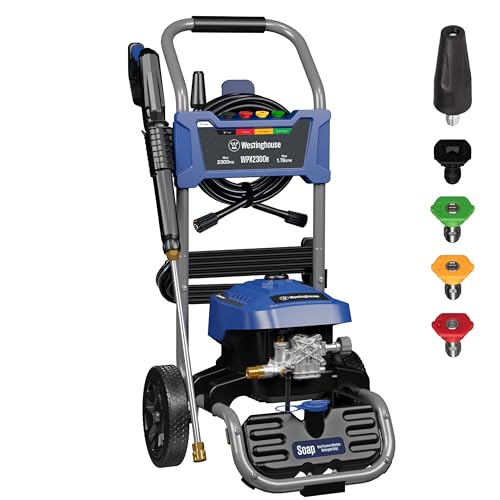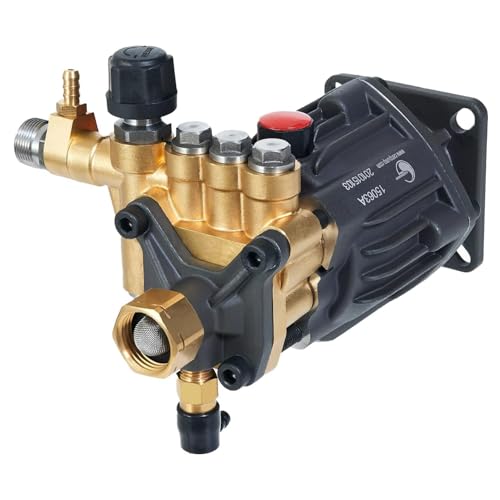

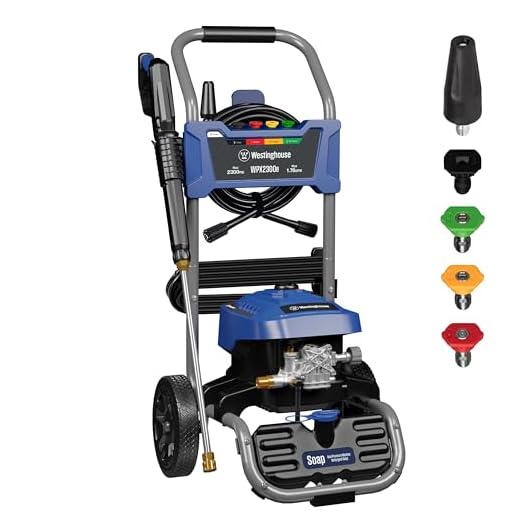
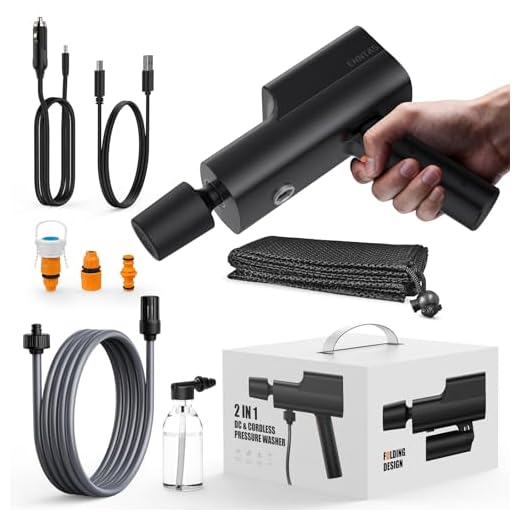
For most home cleaning tasks, an electric-powered machine often stands out as the more practical choice. The convenience of simply plugging it in and getting to work, combined with lower long-term maintenance costs, makes it appealing for regular household use. I’ve found that models typically operate quietly and produce minimal emissions, making them ideal for residential environments and ensuring you can clean without disturbing the neighbours.
In contrast, if tackling larger areas or heavily soiled surfaces is on your agenda, consider gas units. These machines generally deliver higher pressure levels and can operate for longer periods, making them more suitable for commercial tasks or extensive outdoor projects. My experience reveals that they excel in situations requiring robust power, especially where electricity access is limited or non-existent.
When selecting between these machines, assess your cleaning needs carefully. Think about the type of surfaces you’ll be working on, the amount of time you’re willing to spend on maintenance, and your budget. A high-pressure model can be an incredible asset, but choosing the right fuel type can make all the difference in achieving the results you desire.
Recommendation on Choosing Between Two Types of Washers
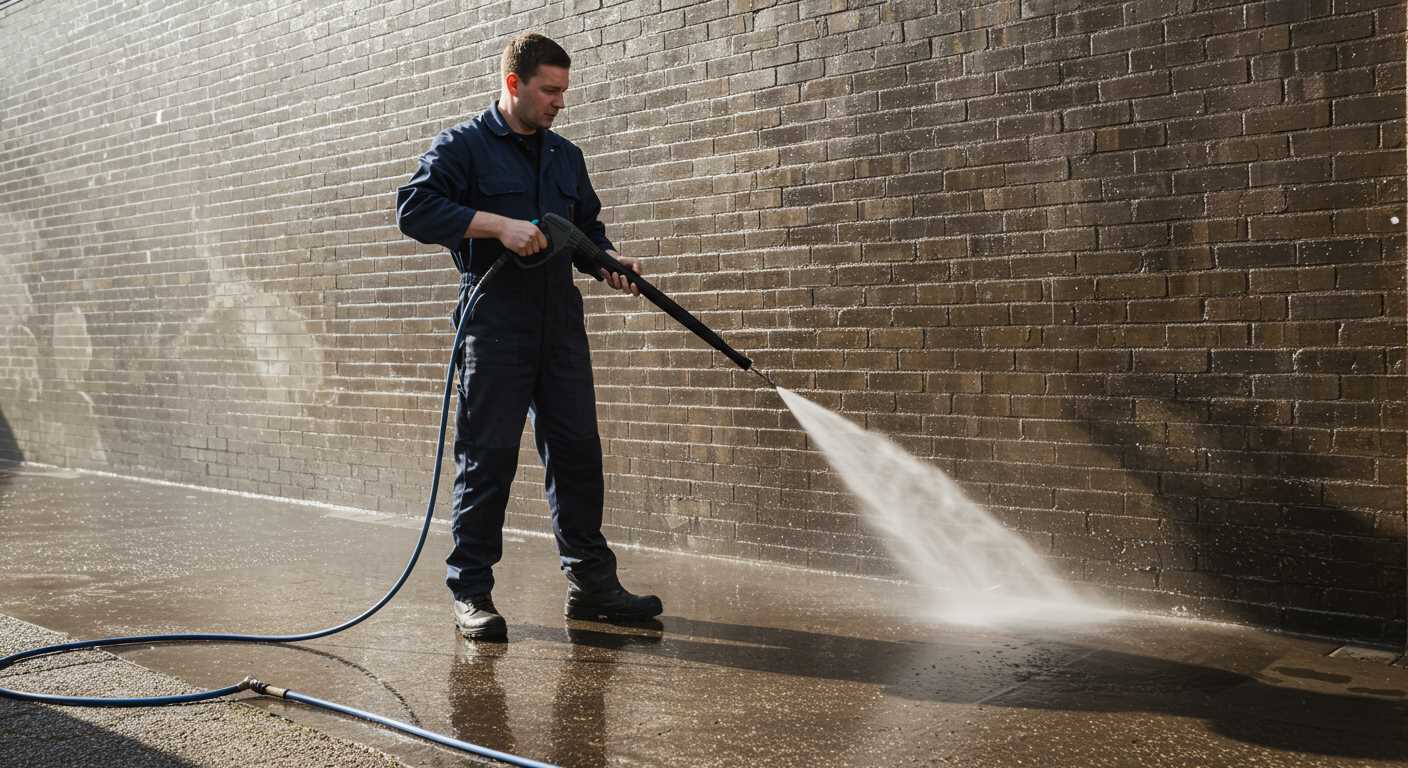
For residential use with light to moderate cleaning tasks, a model powered by electricity is typically the right choice. These units excel at smaller jobs such as cleaning patios, vehicles, and outdoor furniture, providing adequate performance while being user-friendly and quieter.
In contrast, for more demanding tasks, such as tackling tough stains on driveways or wooden decks, opting for a unit that runs on fossil fuel is advisable. These machines generally offer superior power levels, making them ideal for heavy-duty applications.
Key Differences in Performance
| Feature | Electric Model | Gas Model |
|---|---|---|
| Water Pressure | Typically 1300-2000 PSI | Usually 2500-4000 PSI |
| Flow Rate | 1.2-1.5 GPM | 2.0-4.0 GPM |
| Weight | Lighter, easily portable | Heavier, often requires transport assistance |
| Maintenance | Low, minimal upkeep | Higher, requires routine maintenance |
| Noise Level | Quieter operation | Louder, can be disruptive |
| Run Time | Limited by cord length | Continuous as long as fuel is available |
Cost Considerations
Typically, models powered by electricity have a lower initial investment. However, the ongoing cost of maintenance and repairs for fuel-powered alternatives could offset their higher purchase price. For users who plan to engage in regular, intense cleaning tasks, the extra upfront cost might justify the benefits offered by a more powerful unit.
Cost Comparison Between Electric and Gas Pressure Washers
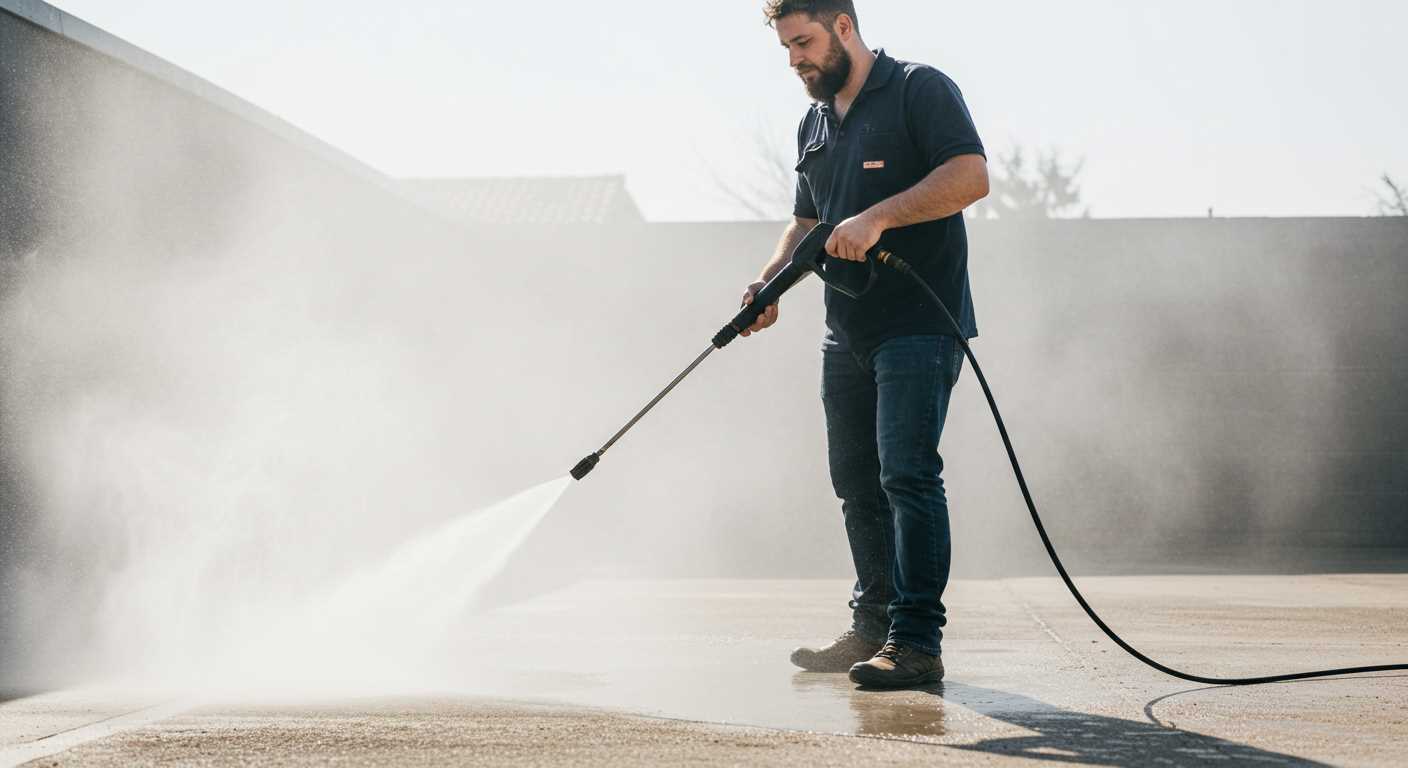
From my extensive experience in the cleaning equipment industry, I’ve often found that the initial purchase price of a cleaning device can significantly influence decisions. Typically, models powered by mains electricity are priced lower than their petrol counterparts. Expect to pay between £100 and £250 for electric units, while gas options usually start around £300 and can exceed £800, depending on the brand and specifications.
Operating Costs
Ongoing expenses should not be overlooked. Electrical devices often have lower operation costs since they only require standard power from outlets. In contrast, petrol models not only need fuel but also regular maintenance, including oil changes and filter replacements. Over time, the cumulative expenses linked to fuel and upkeep can make petrol-operated models more expensive to run, even though they offer higher power output for larger jobs.
Long-Term Value
Considering longevity, electric machines generally have a lifespan of 5 to 10 years, depending on the usage and maintenance. Gas-powered alternatives can last longer if well-maintained, but the additional maintenance can offset any benefits gained from their longevity. If you’re thinking long-term, take into account the total cost of ownership, factoring in both initial purchase and maintenance costs.
Portability: Electric vs Gas Pressure Washers
For those prioritising mobility, my recommendation is clear: choose an electric model. Their lightweight design allows for effortless transportation around residential areas or compact spaces.
- Electric units typically weigh between 20 to 35 pounds, making them easy to lift and manoeuvre.
- Most come with 25 to 35-foot power cords, providing ample range without needing to move the unit too frequently.
- They operate quietly, allowing for use in noise-sensitive neighbourhoods.
In contrast, fuel-powered alternatives generally weigh significantly more, ranging from 50 to 100 pounds. This heft can pose challenges when moving them:
- The larger size often requires a dedicated space for storage and setup.
- They necessitate refuelling, which adds to the logistics of transportation.
- Noisy operation can limit their use in residential areas, especially early in the morning or late evening.
Ultimately, when considering which option best suits your needs based on portability, electric models prove to be the handier choice for most homeowners. The ease of moving them around makes tackling various tasks around the property much simpler and less cumbersome.
Maintenance Requirements for Electric and Gas Models
Regular upkeep significantly influences the lifespan and performance of these cleaning machines. Here are the specific maintenance tasks I recommend for each type.
Electric Units
Maintenance for electric units tends to be less complex. Primarily, you should focus on the following:
- Check and replace the water filter regularly to avoid clogs.
- Inspect the high-pressure hose for signs of wear or leaks.
- Ensure that the power cord is free from damage and fraying.
- After use, store the unit in a dry place to prevent moisture-related issues.
Gas-Powered Units
Gas models require a more hands-on approach for maintenance:
- Regularly change the oil, ideally every 20 hours of operation, to ensure proper lubrication.
- Inspect and clean or replace the air filter to maintain optimal engine performance.
- Keep an eye on the spark plug and replace it if necessary; a clean spark plug aids in effective ignition.
- Use fuel stabiliser if the unit will not be used for a while; this prevents fuel deterioration.
| Maintenance Task | Electric Model | Gas Model |
|---|---|---|
| Water Filter Check | Yes | No |
| Oil Change | No | Yes |
| Air Filter Check | No | Yes |
| Spark Plug Replacement | No | Yes |
| Fuel Stabiliser Use | No | Yes |
| Power Cord Inspection | Yes | No |
By following these maintenance guidelines, both varieties can function efficiently and last longer, saving you money in the long run.
Power Output: PSI and GPM Differences
For effective cleaning, understanding pressure output (PSI) and water flow rate (GPM) is crucial. High PSI signifies the force of water exiting the nozzle, making it suitable for tackling tough grime and stains on solid surfaces. A model with around 3000 PSI is recommended for deeply embedded dirt on driveways or concrete patios.
Conversely, GPM represents the volume of water delivered per minute, influencing how quickly areas can be cleaned. A higher GPM means more water is used, which aids in rinsing away contaminants and improves cleaning efficiency. Machines offering around 2.5 GPM are typically effective for most residential tasks.
The combination of these two factors determines the cleaning power: a machine with 2000 PSI and 1.5 GPM will clean differently than one with 3000 PSI and 2.5 GPM. For large surface areas, a balanced approach with both high pressure and flow rate enhances performance, optimising time and results.
It’s essential to match the tool’s specifications to the task at hand. For delicate surfaces like wood or painted areas, opting for lower PSI–around 1500 to 2000–is advisable to prevent damage. Select models according to the specific cleaning jobs you’ll encounter, ensuring both PSI and GPM align with your needs.
Noise Levels: What to Expect from Each Type

For those seeking quieter operation, models powered by electricity typically generate significantly less noise compared to their fuel-based counterparts. Expect sound levels around 60-70 dB when using an electric variant, making them suitable for residential areas where noise restrictions might apply.
On the other hand, units that rely on petrol engines can produce noise levels reaching up to 80-90 dB. This higher decibel range may not only be bothersome, but it can also lead to potential hearing protection needs during prolonged use.
If working in a neighbourhood or close to homes, I highly recommend opting for electrically powered models due to their quieter operation. In contrast, if raw power is a priority and noise levels are less of a concern, then a fuel-powered machine may be more fitting for heavy-duty tasks.
For those sensitive to sound, consider checking for specific noise ratings before making a purchase. It’s worth noting that some electric options come with noise-dampening features, further minimising sound during use. Therefore, it can be beneficial to look for reviews or specifications that address acoustic performance.
Environmental Impact of Electric and Gas Pressure Washers
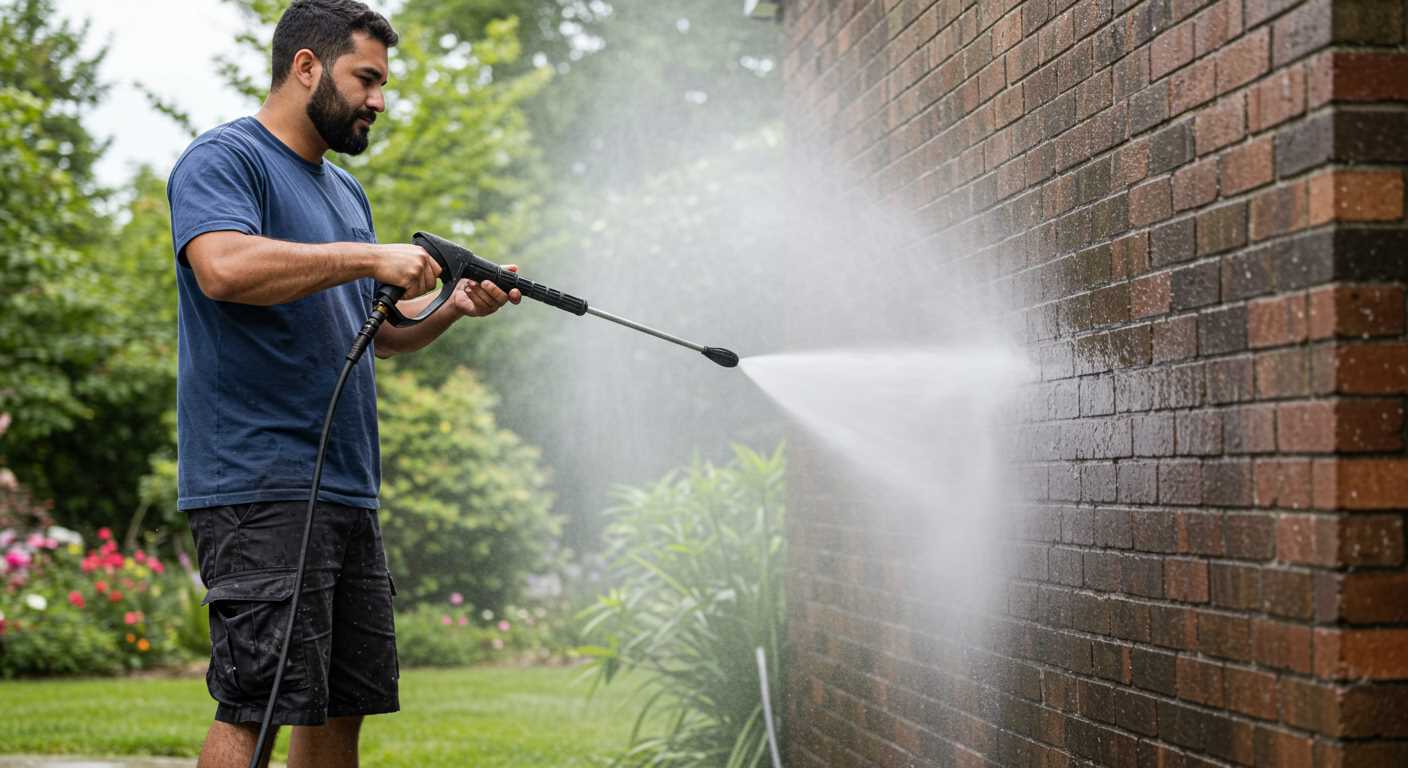
In my experience, the ecological footprint of cleaning devices varies significantly between types. The electrical units typically exhibit a lower impact due to their reliance on electricity, which can be sourced from renewable energies. This aspect plays a vital role in reducing greenhouse gas emissions during operation.
On the other hand, models powered by combustion engines utilise fossil fuels. Their use contributes to air pollution and higher carbon emissions compared to their electric counterparts. When assessing overall environmental consequences, it’s essential to factor in the production and disposal processes as well. Gasoline machines often have more complex manufacturing and end-of-life considerations, leading to a heavier environmental toll.
In terms of noise pollution, the former are generally quieter, promoting a more harmonious outdoor environment. This feature is beneficial not only for the user but also for the surrounding community, which often appreciates reduced noise levels during use.
Ultimately, if sustainability is a priority, opting for an electrically powered model presents a more eco-friendly choice. Users can further mitigate their environmental impact by considering the source of their electricity and ensuring responsible disposal of any worn-out equipment.
Best Applications for Electric vs Gas Pressure Washers

For household tasks such as cleaning patios, vehicles, and outdoor furniture, the electric variety excels due to its lighter weight and ease of use. I recommend using it for:
- Washing cars and bicycles without causing damage.
- Cleaning grills, garden equipment, and outdoor furniture.
- Handling light to moderate stains on driveways and sidewalks.
The gas-powered option is ideal for more demanding projects, where higher pressure and mobility are crucial. It’s best suited for:
- Cleansing larger driveways and garages that are heavily soiled.
- Removing stubborn dirt from large surfaces like decks and fences.
- Conducting commercial or professional cleaning jobs requiring high performance.
Specific Use Cases
When tackling specific activities, I’ve found that:
- Electric models shine in residential settings for their quiet operation.
- Gas variants dominate when continuous operation is necessary, like in construction sites.
Choosing the right tool depends on the task at hand. Assess the surface area, type of grime, and frequency of use to determine the most fitting machine for your needs.

